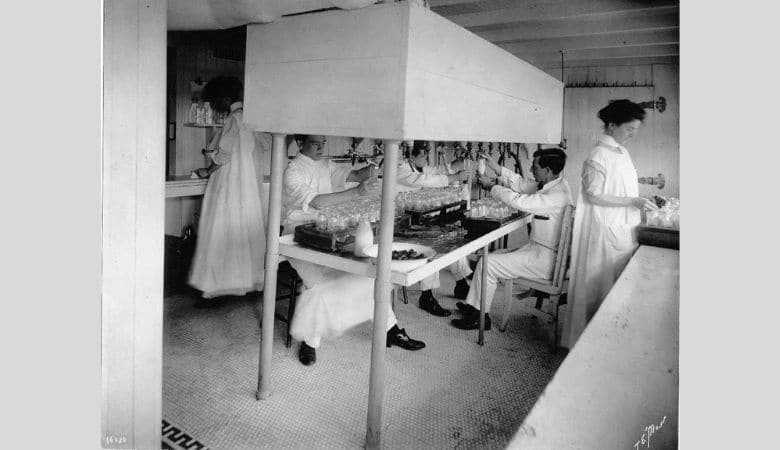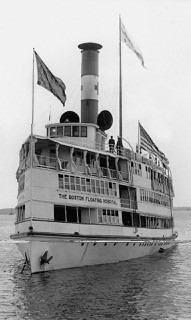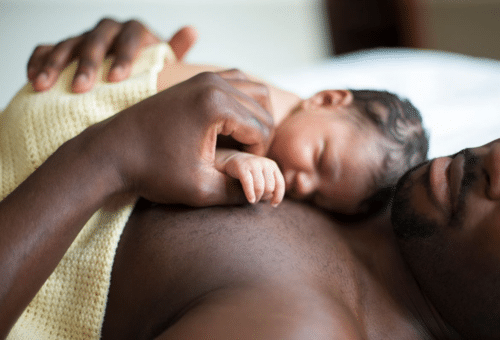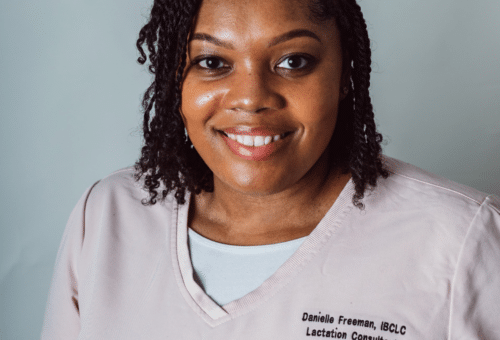
The first US milk bank, at Floating Hospital for Children (photo courtesy of Tufts Medical Center)
For most of the world’s history, breastfeeding was the way babies ate. It did not require a social movement or national and international organizations to support, promote, and protect it. Maybe some day that will be true again. For now though, breastfeeding, like endangered species, requires protection and support across the globe.
North Americans love to celebrate anniversaries and birthdays ending in zeros and fives. 2020-2021 is a celebration of (and directory for) the history of breastfeeding support worldwide.
1956 – 65 years
La Leche League is the mother of breastfeeding organizations. It was established in 1956 in Chicago by seven mothers who wanted to breastfeed their babies and to help other women do the same. La Leche League is now a worldwide organization, with presence and groups in 75 countries. It remains committed to its mission and history of mother-to-mother support and education.
1981 – 40 years
In 1977, the Infant Formula Action Coalition (INFACT) began a very successful boycott of Nestle products to protest unethical and deadly formula marketing practices, primarily in developing countries. The boycott spread throughout the world and resulted in the UN World Health Organization passing the WHO Code for Marketing Breast Milk Substitutes. The Code continues to inform organizations, policies, legislation, and practices throughout the world, related to breastfeeding and far beyond.
1985 – 35 years

Floating Hospital
The first milk bank in North America opened in 1910 at Floating Hospital for Children, now Tufts Children’s Hospital (see photos). By the mid 1980s, there were 53 milk banks in North America. Justifiable fears about HIV transmission closed all but a handful of them almost overnight. These remaining milk banks established the Human Milk Banking Association of North America in 1985. Its original mission was to create evidence-based guidelines for safe pasteurized donor human milk. HMBANA is now the accrediting organization of nonprofit milk banks in North America. In 2020 its 31 members distributed over seven million ounces of donor milk throughout the US and Canada.
1991 – 30 years
In 1991, the Innocenti Declaration, written at a WHO/UNICEF policy meeting, called for governments to implement specific policy measures and agencies to support, promote, and protect breastfeeding. This included a national committee to bring together stakeholders to establish and implement national priorities in this area.
World Alliance for Breastfeeding Action (WABA) is a global network of organizations and individuals who work globally to eliminate barriers to breastfeeding. WABA acts on the Innocenti Declaration and works in close liaison with UNICEF. They also organize World Breastfeeding Week.
The Baby-Friendly Hospital Initiative was launched by WHO/UNICEF following the Innocenti Declaration. It is a global initiative with evidence-based practices to promote breastfeeding among healthy newborns in hospitals. In the US there are over 600 Baby-Friendly facilities in all states, Puerto Rico, and DC. 28% of births in the US occur in Baby-Friendly hospitals. There are more than 20,000 Baby-Friendly birthing facilities in over 150 countries worldwide.
1995 – 25 years
United States Breastfeeding Committee (USBC) was established in compliance with the Innocenti Declaration call for national organized breastfeeding support. USBC now has over 100 member organizations, governmental agencies, and state breastfeeding coalitions in all US states, territories, and tribal lands.
2006 – 15 years
For decades, formula companies have offered free formula to hospitals in exchange for the distribution of promotional bags, including formula samples to new mothers. Research shows that these giveaways, seen as an endorsement from the hospital, undermine breastfeeding. Ban the Bags began its national campaign in 2006 to eliminate this profitable and harmful practice. To date, 1,318 hospitals (41%) throughout the US have “banned the bags.” Four states—Rhode Island, Massachusetts, Delaware, and Maryland, plus Washington, DC—are bag-free in all their hospitals and birthing facilities. We look forward to more states coming on board soon.
Baby Cafés, which originated it the United Kingdom, are “free, drop-in, informal breastfeeding support groups offering ongoing professional lactation care and intervention.” In 2006, Baby Café started its first group in the US, in Melrose, MA. Today Baby Café USA hosts groups in 32 states across the country.
2006 / 2011 – 15 years/10 years
Mothers’ Milk Bank Northeast has both a “zero” and a “five” celebration in our history this year. In 2006, we held our first meeting to discuss opening a milk bank to serve our community and region. In 2011, five and a half years later, we were certified by HMBANA, and we processed and dispensed our first bottles of milk. Recently we screened our 9,000th donor, and in 2020 we dispensed over 500,000 ounces of milk.
2010 – 10 years
The European Milk Banking Association was established in 2010 “to promote milk banking in Europe and to encourage international co-operation between the human milk banks of the countries of Europe.” There are currently 263 active milk banks and 17 planned milk banks in 28 European countries.
Congratulations and our deepest thanks to all who work tirelessly to achieve these organization’s missions and for the unique contribution each makes to breastfeeding history, support, promotion, and protection.
Thanks to Tufts Medical Center for the historical photographs featured in this post.








